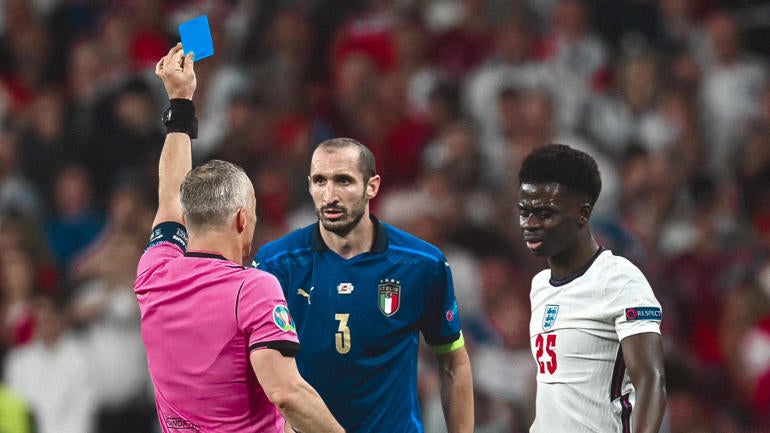
The International Football Association Board (IFAB), which signs off on soccer's rulebook, has postponed a decision to introduce blue cards to represent a sin-bin offense, according to The Times.

Golazo Starting XI Newsletter
Get your Soccer Fix from Around the Globe
Your ultimate guide to the Beautiful Game as our experts take you beyond the pitch and around the globe with news that matters.
Thanks for signing up!
Keep an eye on your inbox.
Sorry!
There was an error processing your subscription.
The Telegraph reported that the IFAB would make the announcement on Friday, but the backlash to the plan apparently led the board to push the decision. The reported postponement comes after FIFA, world soccer's governing body, issued a statement on Thursday pouring cold water over the proposal.
"FIFA wishes to clarify that reports of the so-called 'blue card' at elite levels of football are incorrect and premature," a statement on social media read. "Any such trials, if implemented, should be limited to testing in a responsible manner at lower levels, a position that FIFA intends to reiterate when this agenda item is discussed at the IFAB [annual general meeting] on 2 March."
The blue card would be the first new card for referees to issue since 1970, when both the yellow card and red card were introduced. Blue was picked over orange to ensure the card looks distinct from yellow and red, according to the report.

IFAB approved a sin-bin trial last November, which would allow referees to penalize players by sitting out a match for 10 minutes for offenses that feel more serious than one that would result in a yellow card but less severe than one that would see a player earn a red card. There is currently no timeline for a trial, but England's FA has volunteered to experiment with the rule change for the 2024-25 FA Cup and Women's FA Cup.
FIFA responded to the reports:
"FIFA wishes to clarify that reports of the so-called 'blue card' at elite levels of football are incorrect and premature. Any such trials, if implemented, should be limited to testing in a responsible manner at lower levels, a position that FIFA intends to reiterate when this agenda item is discussed at the IFAB AGM on 1 March."
Here's more on the proposed rule change, including how it works and examples of its use in soccer.
How would sin-bins work?
A referee would issue a blue card to a player for either a cynical foul or dissent, with Giorgio Chiellin's foul on Bukayo Saka in the Euro 2020 final serving as an example of a punishable offense. In that instance, Chiellini tugged Saka's shirt and brought him to the ground.
According to the Telegraph, two blue cards in a match would result in a red card for a player. The same would be true if a player picked up one yellow card and one blue card during a game.
When will sin-bins be tested?
The IFAB has yet to set a date on where and when sin-bins will be trialed in the professional game, though some competitions have already opted in and out. The FA said it would be open to testing the new rule in next season's men's and women's FA Cup competitions, and MLS is also in the mix to try it out, per The Athletic.
UEFA president Aleksander Ceferin, meanwhile, said this summer's Euros will not serve as a testing ground. Ceferin is against the new measure, saying,g "It's not football anymore."
What do the experts say?
CBS Sports rules expert Christina Unkel joined CBS Sports Golaazo Network to talk about blue cards, saying that she understands why traditionalists would be against it, but that if it works, it could make the game run smoother and see an elimination of fouls that would fall under the blue card category.
Watch below:
EXCLUSIVE: Rules expert @ChristinaUnkel breaks down what the blue card could mean for the game of football 🔵👀 pic.twitter.com/G59AEefqHF
— CBS Sports Golazo ⚽️ (@CBSSportsGolazo) February 8, 2024
Have sin-bins been used before in soccer?
England's grassroots game began testing out sin-bins in the 2019-20 season, though referees were using yellow cards and then pointing both arms towards the touchline. The trial was deemed a success, with 72% of players, 77% of managers and 84% of referees approving of the rule change, according to The Athletic.
Sin-bins also led to a 38% decrease in dissent, which is the main driver of the rule change. The IFAB is also fast-tracking a rule change in which only captains can speak to referees, with the organization describing player behavior as potentially being "the cancer that kills football."
















